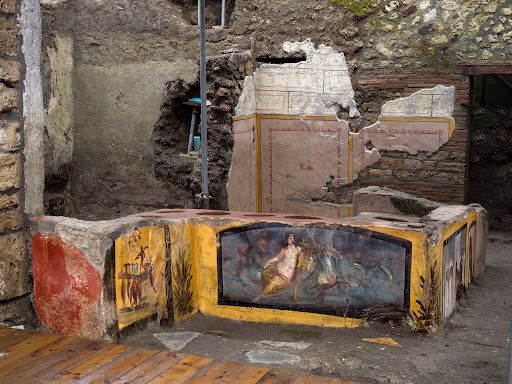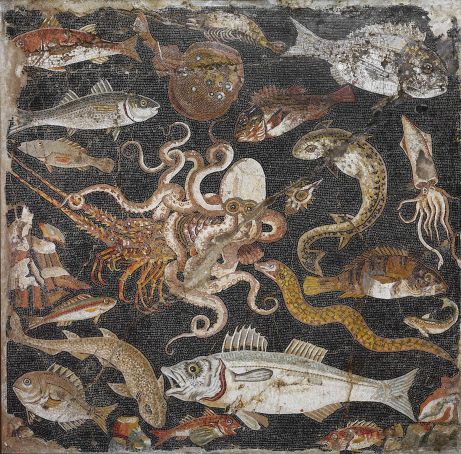A brief survey of the diet in Ancient Rome.
"We are what we eat," according to a much-gnawed chestnut. Early ancient Romans might therefore have been categorised as porridge-guzzling barbarians by the Greeks before Greece was absorbed into the Roman empire.
After 146 BC things became more complicated. To ancient porridge (or puls) – whether beans, spelt or lentils – were added new dishes and flavours, often prepared by Greek cooks brought to Rome as slaves, along with Greek schoolmasters, rhetoricians, even doctors.
This created another divide, kitchen-owning rich vis-à-vis ‘kitchenless’ poor who relied on fast-food joints / thermopolia; Pompeii’s archaeological area has as many as 150.
Spices galore
As the empire spread, so did the variety of foodstuffs. Spices galore arrived from within the empire in the east, from India and beyond. The two most common spices were coriander and cumin, while, to change context, saffron in powdered form would be wafted to quell the blood-and-guts-fuelled stench during the “games” at the Colosseum.

Also more eastern than western was the new cuisine’s combination of sweet and sour, here deriving not from sugar but honey, the best coming again from Greece. Used to sweeten mostly dodgy Roman wine, it glazed meats as well, eliminating, according to ancient chef Apicius, the “strong goatish smell.”
Elsewhere Apicius recommends honey for seabass, tunny-fish, rabbit and boiled ostrich. More dramatically it was mixed in the barley of gladiators’ traditional last meal.
Dormice rolled in honey
Honey could also be the basis of a wonderful cake. Thanks to food expert Sally Grainger, Apicius’s recipe is there on the internet. Or you might try cooking up asparagus custard or cuttle-fish-croquettes.
More tricky would be stuffed nightingales in rose-petals, camels' feet or dormice rolled in honey and poppyseed au Petronius.
Roman diet was not the same for all. One writer infers from skeletons dug up from a pauper’s graveyard just outside Rome that the poor ate little better than livestock. Their worn-down teeth could attest to an excessive millet intake or to badly-ground bread. Thanks to the Annona, the equivalent of the ancient Roman welfare system, two free loaves daily were doled out to 200,000 poor.
Gastronomical excess
This early evidence of a subsidy might be considered as a benefit and a tribute to Roman government. Except panis secondarius or black panis plebius contained grit. The rich’s panis candidus, white and softer, was more like what we consume today.
A more unhealthy trend, this time among the rich, was gastronomical excess. The feast of Trimalchio, the rather vulgar magnate satirised in Petronius’s book Satyricon, is a dietician’s nightmare. Cholesterol levels literally hit the roof as thrushes fly out from the slit stomach of a wild pig and its tusks dangle baskets of dates.
Gluttony
Not that this hedonism in overdrive was typical Martial, writing about Apicius' suicide, is anything but sympathetic: “You chose to make your last toast with a cup of poison./ Even in death, Apicius, you were a glutton’s glutton.” Pliny labels him “the most gluttonous of spendthrifts.” Poor Apicius! Another Martial epigram reads: “Gluttony’s not enough when Tucca tucks in:/ He has to make an exhibition of his sin.”
Elsewhere, the poet sides not with the cook but ‘the cooked’. Martial puts these words into the beak of a peacock: “At my jewelled tail his jaw drops at every look;/ now I’m in his oven, no traitor like a cook.”
Gorging on peacock
Horace in an Epistle quips to a banquet-going correspondent: “Maybe you like the taste of its feathers??/ When cooked, does the bird still maintain its splendour?” Gorging on peacock was considered particularly dangerous for those with heart conditions.
Juvenal warns a stingy gourmand: “But you’ll soon pay a heavy price, when you undress and waddle/ into the bath, still full of undigested meat / hence sudden deaths, and old age interrupted.”*
Back to Martial, on behalf of a crane, here is a more literary reason for restraining one’s appetite: “Kill one of Palamedes’s pet species, / your letters will fly awry, your lines go to pieces,” citing the claim that the Greek hero invented the letter Y (Roman V) from observing a flock of cranes and studying the quasi-linear flight of the birds’ wings and feet.
Romans also had a penchant for flamingos’ tongues. Martial takes the food’s point of view once again: “Red feathers may pen my name, but my tongue is a snack/ for rich gluttons; if only it could talk back…”
Gens Fabia
Roman writers rarely skip a chance to root for frugality. "I don’t live in order to eat, but I eat in order to live," is, in fact, Quintilian’s: Non ut edam vivo, sed ut vivam edo. Beans/ faba as a healthy alternative to the grandest banquet is embodied in Martial’s Xenia XVI: “Broad beans bubbling away in their pot of clay - / id est. Mr Big’s dinner invite can wait until another day.”
The vegetable was so loved that the Gens Fabia, one of Rome’s most ancient families, took their their name from it. Likewise, don't scorn the humble swede: “Winter’s rough delicacy, the cold North’s staple - / What Romulus still feasts on at Heaven’s table.”
In Juvenal frugality is partly a way of reliving the old Republican virtues lost under Diocletian and other emperors. As the imperial elite and the plebs live it up near Juvenal’s town house, within shouting distance of the Circus Maximus, the satirist boasts humbly from his villa about the simplicity of his dining room: “At my feast today we’ll have a very different entertainment…the home-grown tables, carpentered from our own local timber” will be matched by the fare: “My boy has never been able to knock off a guinea-fowl’s wing;/ the best he can manage is the odd pork cutlet.”
Too many banquets
Martial and Juvenal, both of them guest-clients, had attended too many banquets, witnessing how gluttony could be abetted by plain vindictiveness: “The patron, one Virro, is served now ‘with/…a goose-sized capon, and a boar, all steaming hot…”; hard-up guest/client gets ‘half an egg stuffed with a single prawn."

What to us smacks of extreme bad manners, is, in a system of patronage, a means of putting others in their place. As Juvenal warns his friend/fellow 'client' Trebius in Satire 5: “Perhaps you think Virro’s close-fisted? No way. He does it/ to make you suffer.” In Juvenal, food becomes a weapon.
Findings at Pompeii and Herculaneum, however, suggest the rich/poor divide, at least from a dietary viewpoint, has been exaggerated. True the rich had their Triclinium, dining rooms spacious enough to eat lolling on their elbows and fling bones and left-overs onto the floor, less a sign of slovenliness than as offerings to the dead.
With less space the plebs, rather more healthily, ate sitting or standing up. Yet, in the skeletons unearthed, no signs of malnutrition have been found in either group. (The rich are often distinguished by green bones, their having been buried alongside precious metal artefacts.)
Giraffe thigh-bone
That bread was the staple is partly supported by 81 loaves carbonised following Vesuvius’s eruption. A host of other clues come from the 700 bags of ancient excrement (the world’s largest ever) from Herculaneum’s sewers and hitherto “plugged” by 50 feet of volcanic detritus.
In with the odd bits of jewellery (Romans would snack in the baths) have emerged nuts, carbonised eggs, pomegranates and chicken-bones and, to match Apicius’s most salivating dreams, a giraffe’s thigh-bone.
To keep company with an oyster-shell and bone of sea-bream (spigola) unearthed in the Colosseum, were fish and seafood. Both were so popular that Diocletian passed a decree against overfishing. The patrician class, including Horace, got round this by building fish-farms. As Martial puts it: “These mullet thrashing breathlessly in their scuppers/ are dying by inches. Out at sea, they’d be whoppers.”
One account describes a mullet costing three horses; Juvenal’s Satire IV stars a mullet so grand the emperor holds a state council on how best to cook and serve it. Meanwhile mosaics in Bardo and elsewhere in Tunisia feature “monster” groupers as big as the fisherman that could catch them.
Garum
A fish offshoot and again seemingly more oriental than western is garum, the closest modern equivalent to Thai fish-sauce. This sun-fermented fish-blood and viscera was a staple of the legionnaire's mess kit. Martial, striving to pin down its smell, likens it to a broken urinal, lion’s mouth, rotting chicken embryo, a billy-goat on heat.
Garum was also considered an aphrodisiac, one explanation, anyway, for its otherwise unlikely popularity. Excavations in Israel and Spain have unearthed factories built to meet imperial demand and 300 garum-amphorae were dredged up off the Ligurian coast in 2015 from a ship sailing out from Spain and bound for Rome.
On a more appetising note, what about pizza? Tomatoes, like potatoes and sugar-cane, still awaiting their Columbus, this was a pleasure ancient Romans were denied. Yet there is a proto-pizza in Virgil, predating (and prefiguring) the foundation of Rome itself: Aeneas and his companions, resting near the mouth of the Tiber, “set out a meal, and inspired by mighty Jove, / put wheaten cakes on the grass to use as platters/ and piled this meal of Ceres with wild fruit…” (Aeneid, Bk VII).
This fulfils Anchises’ prophecy, “My son, when you have touched an unknown shore and…bereft of food… are forced by hunger/ to eat your tables then…/ you can hope for a home there ,/ There lay your first foundation …”*
By Martin Bennett
This article was published in the online January 2022 edition of Wanted in Rome magazine. Cover image: Roman fresco showing wealthy Romans dining, collection Museo Archeologico Nazionale di Napoli.
*Martial, translated by Martin Bennett
* Juvenal, all extracts translated by Peter Green, Penguin Classics
*The Aeneid, translated by Patric Dickinson, Mentor Classics




















